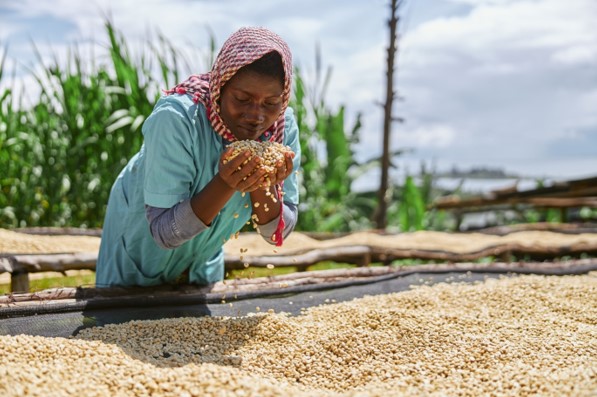Investing in opportunities for rural women
Improving the lives of rural women is one of our key objectives. In many places they face entrenched gender biases that prevent them from accessing the crucial elements a smallholding needs to prosper, such as access to finance, land rights, and tools, techniques and seeds that boost crop yields.
The work of rural women is also often undervalued and usually unpaid because they are contributing to the family smallholding. In addition, they contend with poor working conditions and limited social protections. But they play a crucial role in their local agriculture and forestry sectors and, in turn, the development of their local communities.
In developing countries women make up around 43% of the agricultural labour force. According to the FAO, if they had the same access to productive resources as men they could increase yields by 20-30% which could lift up to 150 million people out of hunger.
We actively seek to invest in projects that can unlock this potential, in fact 63% of the beneficiaries of our 2021 activities are expected to be women. Here are some ways agribusinesses we support are addressing the issue.
Backing women-led change in Kenya
When women are in leadership positions, positive change accelerates. That’s one of the reasons we invested USD 0.6 million in Kenyan macadamia nuts processor and exporter, Exotic EPZ. Led by three women – Charity Ndegqa, Loise Maina and Jane Maigua – it has put supporting women smallholders at the heart of its business.
The company provides access to health insurance, mobile payment capabilities and tools that monitor crop yields. They also train women farmers in the latest growing techniques and how to run a business more effectively. These are all vital stepping-stones to increasing incomes and building independence. With our support it aims to expand its customer base in Europe, the US and Asia, increasing the number of smallholders it works with from 2,000 to 5,000 in the process.
Spreading the equality message from Rwanda
Rwanda is leading the way when it comes to gender equality, not just in Africa but internationally. The country is 6th in the World Economic Forum’s Global Gender Gap Index 2022. One of the driving forces behind it is the political commitment to the cause. In 2003 legislation was put in place to ensure 30% of elected positions were always held by women and by 2013, 64% of seats were filled by women candidates.
This dedication to equality is now reflected in Rwanda’s business community, particularly in the coffee sector. Unlike in some neighbouring countries, women are able to set up their own businesses without the permission of a man, access affordable loans and benefit from secure land ownership. COOPAC, which producers certified organic and fairtrade coffee, is at the forefront of this movement. The company is constantly looking for ways to enhance the livelihoods of women smallholders by training them, buying from them and paying a premium price.
We’re supporting COOPAC to expand both its operations and its progressive ideals into the wider region. Our USD 1.5 million investment has enabled it to develop its business over the border in the Democratic Republic Congo (DRC), where it will provide women farmers with the knowledge and infrastructure they need to produce high quality coffee for export. This cross-border partnership is more than a commodity led commercial activity; it is a music of unity in diversity as well. Africa needs COOPAC in droves.
Narrowing the gender gap in Colombia
At the forefront of cocoa trader Colcocoa’s drive to create more opportunities for women farmers is its 350-hectare Hacienda La Tentación. In 2013 it developed a gender-inclusive policy for the farm, which embedded the equitable inclusion of women in all work teams and measures to promote their participation and empowerment.
It’s an initiative that’s desperately needed in Colombia, which is 75th in the Global Gender Gap Index. Women are supported to train and progress, while benefits such as flexible maternity leave enable them to build careers around their lives and gain economic independence at home. This has raised job satisfaction and led to better staff retention. Colcocoa has also worked with the no name chocolate brand to write Latin American Women Who Dare, a book aimed at inspiring rural women and girls to overcome the barriers they face.
We supported Colcocoa in 2021 with a loan of almost EUR 1.4 million to grow production at the Hacienda, boost smallholder incomes and promote job creation for women.
Colcocoa’s drive to localize the development makes provisions so that women from local, indigenous and tribal communities can make use of their traditional knowledge that is key for their communities’ livelihoods, resilience and culture.
There’s much work still to be done, which is why we’re eager to collaborate with local organisations that are creating opportunities for rural women. We are working to make commodities work for the communities. The potential is there, together we can unleash it.

